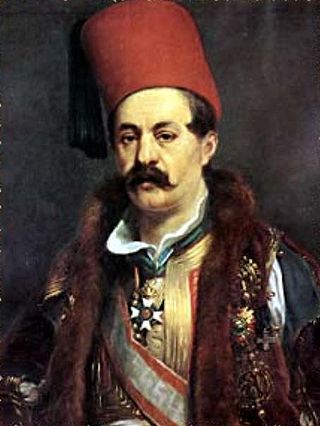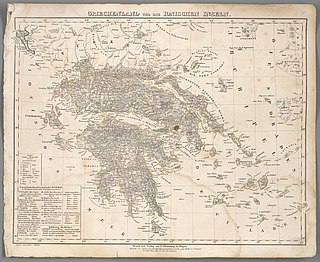
Otto was King of Greece from the establishment of the Kingdom of Greece on 27 May 1832, under the Convention of London, until he was deposed in October 1862.

The prime minister of the Hellenic Republic, usually referred to as the prime minister of Greece, is the head of government of the Hellenic Republic and the leader of the Greek Cabinet.

Ioannis Kolettis was a Greek politician who played a significant role in Greek affairs from the Greek War of Independence through the early years of the Greek Kingdom, including as Minister to France and serving twice as Prime Minister. Kolettis is credited with conceiving the Byzantine restorationist and irredentist Megali Idea or "Great Idea" which became the core of Greek foreign policy until the early 20th century.

Andreas Metaxas was a Greek politician, fighter of the Greek War of Independence and diplomat from Cephalonia. He was prime minister of Greece from 3 September 1843 to 16 February 1844. Some military leaders of the revolution (Makriyannis) gave him the ironic nickname of "Conte Lalas'" due to his injury during the Battle of Lalas.

Dimitrios Kallergis was a fighter of the Greek War of Independence, major general, politician and one of the most important protagonists of the 3 September 1843 Revolution.

The First National Assembly of Epidaurus was the first meeting of the Greek National Assembly, a national representative political gathering of the Greek revolutionaries.
The Greek national assemblies are representative bodies of the Greek people. During and in the direct aftermath of the Greek War of Independence (1821–1832), the name was used for the insurgents' proto-parliamentary assemblies. Thereafter, the term has been used for a number of extraordinary assemblies chiefly in regard to changes in the Constitution and the form of government of Greece.

Athanasios Miaoulis was a Greek military officer and Prime Minister of Greece. Born in Hydra in 1815, Miaoulis was the son of the famous Greek admiral Andreas Miaoulis, from whom he learned his navigation skills.
In the modern history of Greece, starting from the Greek War of Independence, the Constitution of 1975/1986/2001 is the last in a series of democratically adopted Constitutions.

The history of the Hellenic Republic constitutes three republican periods in the modern history of Greece: from 1822 until 1832; from 1924 until 1935; and from 1974 through to the present. See also the constitutional history of Greece.

The President of the Hellenic Parliament is the presiding officer of the Parliament of Greece. The president's term coincides with the term of the assembly,and is chosen by a vote during the opening session, after each legislative election. Following is a list of speakers of the Hellenic Parliament or other national legislative bodies such as the Greek Senate, from the time of the Greek War of Independence till present. The official order of precedence ranks the speaker of the Hellenic Parliament in the 3rd position, after the President of the Republic and the Prime Minister.
Constitutional Assembly elections were held in Bulgaria on 10 June 1990, with a second round for eighteen seats on 17 June. They were the first elections held since the fall of Communism the previous winter, and the first free national elections since 1931. The elections were held to elect the 7th Grand National Assembly, tasked with adopting a new (democratic) constitution. The new electoral system was changed from 400 single-member constituencies used during the Communist era to a split system whereby half were elected in single member constituencies and half by proportional representation. The result was a victory for the Bulgarian Socialist Party, the freshly renamed Communist Party, which won 211 of the 400 seats.

Parliamentary elections were held in Cyprus in 1960. The House of Representatives was elected on 31 July 1960. The Communal Chambers were also elected on 7 August. In the House of Representatives 35 seats were elected by Greek Cypriots and 15 by Turkish Cypriots. The result was a victory for the Patriotic Front, which won 30 of the 50 seats. In the Communal Chambers, the Patriotic Front won the majority of seats in the Greek Chamber, whilst the Cyprus Turkish National Union won all seats in the Turkish Chamber.
Parliamentary elections were held in Greece on 16 December 1843. The elected body was also tasked with drawing up a constitution, following the 3 September 1843 Revolution. The Three-Party Coalition won almost half the seats in the 243-seat Chamber.
Parliamentary elections were held in Greece in June 1847. Supporters of Ioannis Kolettis won a majority of the 127 seats. However, he remained Prime Minister only until his death on 17 September, after which Kitsos Tzavelas assumed office.

Pavlos Kalligas was a Greek jurist, writer and politician, who served as professor at the University of Athens, Member and Speaker of the Hellenic Parliament, cabinet minister for Foreign Affairs, Education, Finance and Justice and chairman of the National Bank of Greece.

Panoutsos Notaras was a Greek revolutionary and politician who was a leading figure of the Greek War of Independence, serving several times as president of the Greek national assemblies and legislative bodies.

Dimitrios Christidis was a Greek politician and economist. He served as Speaker of the Hellenic Parliament, Minister of Finance, Minister of Internal Affairs, Minister of Foreign Affairs and Minister of Justice. He was a Senator (1846–1851) and advisor to the State Council established by the Greek Constitution of 1864. He was elected several times as member of Parliament for Syros (1847–1877).
A number of different and competing administrations used the name Administrative Committee(Greek: Διοικητική Επιτροπή) throughout 1832, each claiming responsibility for a different part of Greece, all after the dissolution of the Administrative Committee of 1831 of Augustinos Kapodistrias, Theodoros Kolokotronis, and Ioannis Kolettis and before the installation of King Otto of Greece.

A regency council ruled the Kingdom of Greece in 1833–1835, during the minority of King Otto. The council was appointed by Otto's father, King Ludwig I of Bavaria, and comprised three men: Josef Ludwig von Armansperg, Georg Ludwig von Maurer, and Carl Wilhelm von Heideck. The first period of the regency saw major reforms in administration, including the establishment of an autocephalous Church of Greece. The regency's authoritarianism and distrust of the Greek political parties, especially the Russian Party, which was associated with the period of Governor Ioannis Kapodistrias and was particularly opposed to the Church reforms, led to a quick eroding of its popularity. Armansperg was the council's chairman, but increasingly clashed with the other two regents, who in turn aligned with the French Party under Ioannis Kolettis. The main domestic event of the early period was the arrest and sham trial of Theodoros Kolokotronis, a hero of the Greek War of Independence and the de facto leader of the Russian Party, in 1834. This rallied the opposition against the regency, helped provoke a major uprising in the Mani Peninsula, and fatally undermined the prestige of Maurer and Heideck versus Armansperg. The conflict was resolved in Armansperg's favour in July 1834, when Maurer was replaced by Egid von Kobell. Following Otto's coming of age in June 1835, the council was dissolved, but Armansperg remained in charge of the government as Prime Minister.














